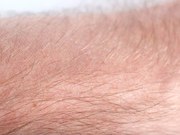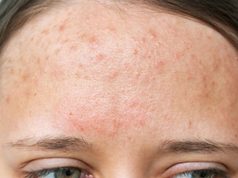Most common cutaneous finding in women with polycystic ovary syndrome
MONDAY, Oct. 2, 2017 (HealthDay News) — There is a strong correlation between hirsutism and metabolic dysfunction in women with polycystic ovary syndrome (PCOS), according to a study published online Sept. 21 in the Journal of Cosmetic Dermatology.
Jin-ge Feng, M.Med.Sci., from Fu Xing Hospital of Capital Medical University in China, and colleagues retrospectively studied 186 women with PCOS and 113 age-matched women without PCOS. Acne grade, hirsutism, seborrhea, androgenic alopecia (AGA), and acanthosis nigricans (AN) were recorded. Hormonal and metabolic measurements were also taken.
The researchers found acne severity, location, and type did not differ between the groups. However, significant differences existed for free androgen index, sex hormone-binding globulin, and body mass index between the PCOS-with-acne and PCOS-without-acne groups. In PCOS with hirsutism, age was significantly decreased, while BMI was significantly higher. There were significant elevations in mean serum total testosterone, dehydroepiandrosterone sulfate, and FAI between the PCOS-with-hirsutism and PCOS-without-hirsutism groups.
“This study indicated a strong correlation between hirsutism and metabolic abnormalities. Acne and AGA are associated with other manifestations of clinical hyperandrogenism, but not obvious markers of biochemical hyperandrogenemia and metabolic dysfunction,” conclude the authors.
Copyright © 2017 HealthDay. All rights reserved.








